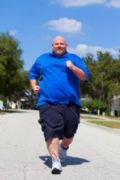|
Everything seems a little more difficult when you don't get enough sleep. Between the non-stop yawning, heavy eyelids and some serious brain fog, just rolling out of bed can feel like exercise. But what should you do when you do have a legitimate workout scheduled on those days? To go or not to go? Lack of sleep happens to the best of us. Perhaps you have jet lag, worked a late shift or have a lot on your mind. Maybe your pup just decided to give you an early wake-up call. Regardless of the reason, it's normal to feel tired every now and then. What does that mean for your fitness routine, though? It can be a tricky decision, especially when you've got a good thing going. You know exercise will give you energy, but you also need energy to break a sweat. Talk about a catch-22. The Real Question: Are You Actually Tired?First thing's first: Check in with yourself to make sure tiredness isn't just masking a lack of motivation. Take care to truly listen to your body. Does it feel sluggish or heavy? Is it a bit weary—but you know you've felt worse? Pay attention to the reasons in your head. If the same excuses keep popping up, it might be time to have a pep talk with yourself. Keep in mind that dehydration might also be at play. "Being dehydrated will leave you feeling sluggish and slow," says Chantal Toscano, C.P.T., a certified personal trainer in New York, New York, so it's important to drink water throughout the day. Even mild dehydration causes headaches and muscle cramps. If you're feeling tired, knock back some H2O and see how you feel. Tired Versus ExhaustedFiguring out if you're tired or exhausted is the deciding factor. And yes, there is a difference. If you allowed yourself to get adequate rest the night before—the National Sleep Foundation recommends seven to nine hours for adults—it's probably not enough to ditch a workout. "Though I'd recommend seven or more hours [of sleep], you can consider a low-to-moderate intensity workout if you're just feeling a little groggy," advises Venus Ramos, M.D., a licensed rehabilitation physician and fitness consultant in Long Beach, California. "An In this case, she suggests that you start slow. "Allow your body and mind to warm up before you decide to bump up the intensity." But when drowsiness is so bad that "tired" graduates to "exhaustion," it's a different story. Exhaustion makes your legs feel like jelly and your brain feel like fuzz. A simple task like making breakfast might seem like a workout in itself. And when it comes to exercise? "Working out could also do more harm than good," says Toscano. Dangers of Working Out While Exhausted1. High Risk of Injuries "You're more prone to injuries when you are very tired," explains Toscano. "The body is slower to react to stimuli, and your senses are dulled." There's a risk for every kind of exercise. Running and dance can be dangerous since you're less aware of surroundings and maybe even your own two feet. Adding machinery or weights to the mix is also a recipe for disaster. "Not only are you less mentally alert to focus on moving in a coordinated manner, your muscles may feel too weak to maintain proper form," adds Dr. Ramos. In turn, the workout won't be able to do its thing and the risk of injury increases. 2. Decreased Performance Maintaining a fitness routine is all about progress. But when you're exhausted, it's one big roadblock. Performance (and cognition) will take a nosedive, as seen in a 2013 study in Medicine & Science in Sports & Exercise. The perceived exertion of exercise will also increase. In other words, the entire workout will feel harder, even if you've done it before, which can be a motivation killer. 3. Impairs Immune System Exhaustion threatens your immunity. In a preliminary 2016 study featured in Sleep Science journal, scientists discovered that exhaustion can decrease white blood cells, especially if you continuously get little sleep. These effects worsen when you exercise on an empty tank. "Even one night of poor sleep increases your cortisol levels," Dr. Ramos explains. "[This] suppresses your immune system so that you may not be able to fight off infection. Add that to the stress of an intense workout, and that's a double whammy when it comes to your risk of catching that next virus making its rounds." Are you on Team Exhaustion? Cut yourself a break and take a nap. Lack of sleep adds up, and it can cause issues over time. Giving your body the chance to relax and reset is the least you can do when your body is already stressed. Exercises to Do When You're Feeling TiredIf you're only dealing with grogginess, ditching your fitness routine isn't necessary. Try one of these expert-approved exercises for a light and easy workout. 1. Light Cardio A gentle cardio session is sweet, simple and will boost your energy. "This can include walks on the treadmill or cycling on a stationary bike, recumbent bike or elliptical," shares Toscano. "If you're having trouble dragging yourself too far from the couch, try marching in place in front of the TV," recommends Dr. Ramos. Top it off with exercises like jumping jacks, pushups and squats. 2. High-Energy Class Another way to get your blood flowing is to attend an energetic exercise class. Toscano's top picks? "Zumba and spinning will wake you right up." Other ideas include aerobics, jazz or hip-hop classes. 3. Yoga Yoga might be relaxing, but it'll also boost your energy, according to one 2017 study in Frontiers of Psychology. Even your self-esteem and mood will get an upgrade! The best part? All it takes is two minutes to feel these effects. 4. Stretching To take things even slower, practice general stretching. Don't focus on specific flows or sequences. Instead, reach for your toes or the sky, or lunge to each side. Do what feels good. The great news is that stretching is safe even if you're exhausted. It might even ease aches and pains that come with sleep deprivation. Remember that there are some situations where tiredness gets the upper hand. If you're just recovering from a cold, illness or surgery, be easy on yourself. Always be your body's best listener, because you're all it has. |







